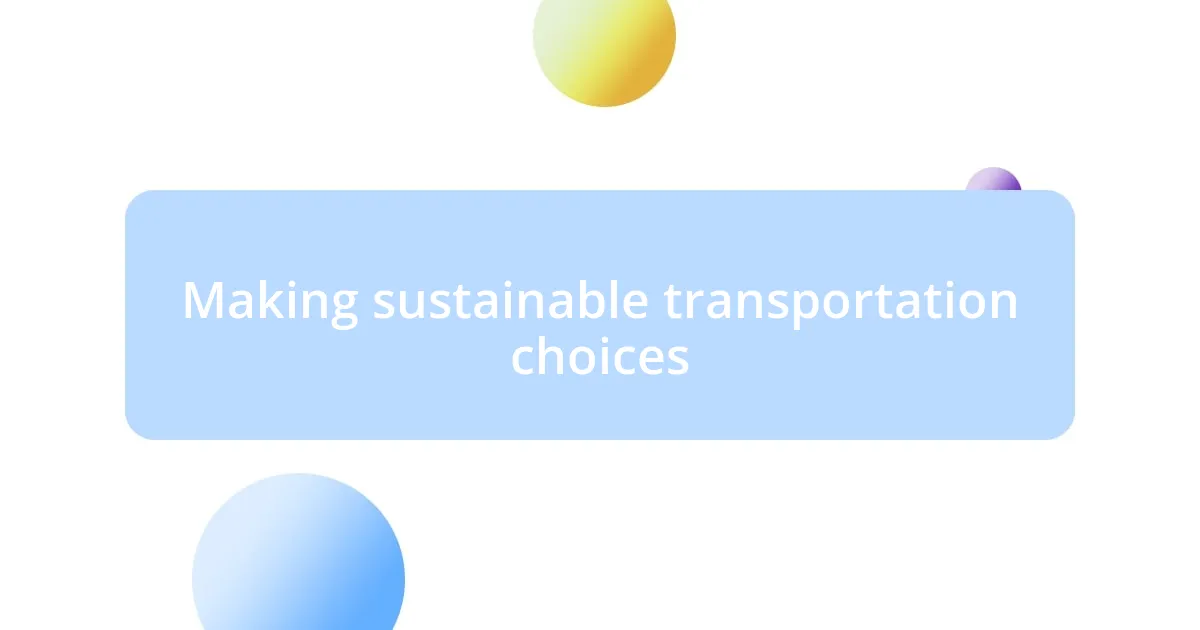Key takeaways:
- Sustainable travel emphasizes mindful choices that positively impact the environment and local cultures.
- Engaging in local traditions and supporting local businesses enhances travel experiences and fosters community connections.
- Choosing eco-friendly accommodations and sustainable transportation contributes to environmental conservation and personal well-being.
- Minimizing waste through practices like using reusable items and participating in local initiatives helps preserve destinations for future travelers.

Understanding sustainable travel
Sustainable travel is all about making mindful choices that leave a positive impact on the planet. I still remember my first trip to Costa Rica, where I hiked through lush rainforests and learned about eco-friendly tourism practices. It made me question: how often do we think about the environmental cost of our adventures?
Understanding sustainable travel goes beyond simply reducing carbon footprints; it’s about fostering respect for local cultures and ecosystems. I once participated in a community-based initiative where locals taught us traditional crafts. The sense of connection I felt was profound. Isn’t it amazing how travel can transform not just our perceptions but also the places we visit?
At its core, sustainable travel encourages responsible behavior. I often reflect on those moments when I opted for a bicycle instead of a taxi in Amsterdam. The thrill of exploring the city at a slower pace allowed me to truly appreciate its beauty. Have you ever considered how your choices can enhance the very experiences you cherish while traveling?

Benefits of sustainable travel
When I think about the benefits of sustainable travel, I’m struck by how it allows us to foster a deeper connection with the places we visit. On a recent trip to a small island community, I opted to stay in a locally owned guesthouse. Not only did this support the local economy, but I also felt welcomed and engaged with my hosts. They shared stories about their traditions and the challenges of preserving their way of life. It’s moments like these that remind me how meaningful travel can be when it intentionally respects and honors local culture.
Sustainable travel contributes positively to the environment and local communities in various ways:
- Reduced Environmental Impact: Choosing eco-friendly accommodations often leads to less waste and lower energy consumption.
- Enhanced Local Experience: By engaging in local tours or workshops, you gain authentic insights and help preserve cultural heritage.
- Support for Local Economies: Spending money on local businesses encourages economic growth and job creation within the community.
- Improved Personal Well-being: Connecting with nature and local cultures can lead to a more fulfilling travel experience, leaving you physically and emotionally rejuvenated.
- Inspiration for Others: By sharing your sustainable travel experiences, you encourage fellow travelers to follow suit and make responsible choices.
Embracing these benefits not only enriches our journeys but also helps protect the places we love for future generations.

Choosing eco-friendly accommodations
When I choose accommodations, the options can feel overwhelming, but I always prioritize eco-friendly places. I’ve found that many sustainable hotels incorporate green practices such as solar energy and water-saving systems. For instance, during my stay at a coastal eco-lodge, I was pleasantly surprised to learn that they used reclaimed water for their gardens, which not only looked stunning but also sparked my interest in local conservation efforts. It was a reminder that small actions can lead to significant environmental benefits.
Something I’ve discovered is that booking with certified eco-friendly brands adds another layer of assurance for sustainable practices. I once booked a charming cabin through an eco-certification platform that highlighted sustainable approaches to hospitality. The experience went beyond just a place to sleep; it felt like contributing to a larger mission. The warm glow of the evenings spent in the company of other eco-conscious travelers sparked discussions about sustainability that lingered long after I returned home.
Reflecting on my travels, I realize how choosing accommodations that align with my values opens up a world of connections. The last time I opted for a green hotel, not only did I admire its commitment to sustainability but I also found myself engaging with staff who were passionate about preserving their environment. That sense of shared purpose deepened my travel experience, showing me that eco-friendly accommodations aren’t just places to stay—they’re part of a larger community effort in safeguarding our planet.
| Criteria | Eco-Friendly Accommodations |
|---|---|
| Energy Efficiency | Uses renewable energy sources like solar panels |
| Water Conservation | Employs water-saving fixtures and reclaimed water systems |
| Local Sourcing | Sources food and materials from local producers |
| Sustainability Certification | Obtains certifications from recognized eco-friendly organizations |

Making sustainable transportation choices
Making sustainable transportation choices can significantly enhance the experience and the impact of your travels. For instance, during my last trip to Europe, I decided to forgo car rentals in favor of trains and bicycles. The joy of gliding through picturesque landscapes by train allowed me to appreciate the scenery in ways that driving simply couldn’t match. Isn’t it fascinating how arriving at a destination can feel like part of the adventure itself when you embrace sustainable options?
Sometimes, the simple act of walking becomes a joyful part of my travels. There’s something special about exploring a new city on foot; it’s as if the surroundings come alive and invite you to interact with them. When I strolled through cobblestone streets in a quaint town, I discovered hidden cafes and local artisans that I might have missed in a car. The direct engagement with the environment fosters a sense of belonging and connection that I cherish. Have you ever had a moment where you stumbled upon a gem while walking? I’d say those moments are often the highlights of any journey.
On longer journeys, opting for public transportation not only benefits the environment but also enriches my experience. I remember taking a bus through the national parks in a breathtaking part of the world. The conversations with fellow travelers were just as beautiful as the views, and we exchanged stories that enriched our understanding of the area. That connection wouldn’t have happened if I had chosen a private car. Isn’t it amazing how sustainable transportation can open up new avenues for interaction and learning? Each choice we make has the potential to turn our travels into a memorable tapestry of experiences.

Packing for responsible travel
When it comes to packing for responsible travel, I always aim to bring items that are both functional and eco-friendly. One of my favorite strategies is choosing reusable bags for shopping and carrying my essentials. I once forgot my canvas tote on a trip, and the awkwardness of fumbling with plastic bags from a local market made me realize how a small misstep can affect my commitment to sustainability. Has anyone had that moment of regret for forgetting something simple?
Another packing tip I’ve embraced is to opt for a capsule wardrobe filled with versatile, sustainably-made clothing. This strategy not only reduces my luggage weight but also helps me minimize my environmental footprint. I remember, during a trip to a vibrant city, wearing the same pair of shoes almost every day. I paired them with different outfits, and not only did I feel good about my eco-conscious choices, but I also attracted compliments for my creativity. There’s a unique satisfaction in creating distinct looks while staying true to sustainability, don’t you think?
Finally, I’ve found that including a kit of eco-friendly toiletries can significantly enhance the overall experience of responsible travel. I once packed bamboo toothbrushes, solid shampoo bars, and refillable containers for my skincare products. Not only did they take up less space, but they also sparked conversations with fellow travelers intrigued by my choices. Creating a small zero-waste routine on the road feels like a personal commitment to the planet, and seeing others take interest in it brings a sense of camaraderie. Have you ever considered how your packing choices might inspire others?

Engaging with local communities
Engaging with local communities is one of the most rewarding aspects of travel. On my last trip to a remote village, I participated in a local cooking class where the instructor shared not just recipes, but also stories about family traditions and customs. It struck me how food, a universal language, can create bonds across cultures. Have you ever found that your relationship with a place deepens when you connect with its people?
I also remember stumbling upon a community-led marketplace while exploring a bustling city. Vendors were eager to share their crafts, and I found myself captivated by their passion and stories behind each handmade item. Buying directly from them felt like a small yet significant way to contribute to their livelihood. The sense of authenticity in those interactions was extraordinary. Isn’t it incredible how such simple exchanges can lead to lasting memories?
Moreover, volunteering during my travels has transformed my understanding of local dynamics. Once, I joined a beach cleanup in an area heavily reliant on tourism. As I worked alongside local residents, their dedication to safeguarding their environment inspired me deeply. It’s not just about the hours spent; it’s about the shared purpose and knowing you’ve made a positive impact. Have you thought about how giving back to a community can enhance your own travels?

Minimizing waste while traveling
One effective way to minimize waste while traveling is to carry a reusable water bottle. On a trip to a breathtaking beach destination, I was amazed by the number of plastic bottles littering the shore. I started filling my reusable bottle from filtered water stations, not only cutting down on plastic waste but also enjoying the refreshing feeling of hydration without guilt. Have you ever considered how much waste you could eliminate by simply opting for a refillable bottle?
Another strategy that has made a significant difference for me is choosing accommodations that prioritize sustainability. During a recent stay at an eco-friendly lodge, I was greeted with notes encouraging guests to recycle and conserve water. It felt good to be part of a community that values the environment just as much as I do. Have you felt that sense of alignment when staying somewhere that shares your eco-conscious values?
Lastly, I always keep reusable utensils and a small container in my bag for leftovers, which I learned to value after experiencing food waste in bustling street markets. After savoring a delicious meal, I’d often see untouched food tossed away. Using my own container not only allowed me to enjoy every bite later but sparked conversations with locals about food preservation. Isn’t it wonderful how small actions can lead to meaningful discussions about sustainability?














